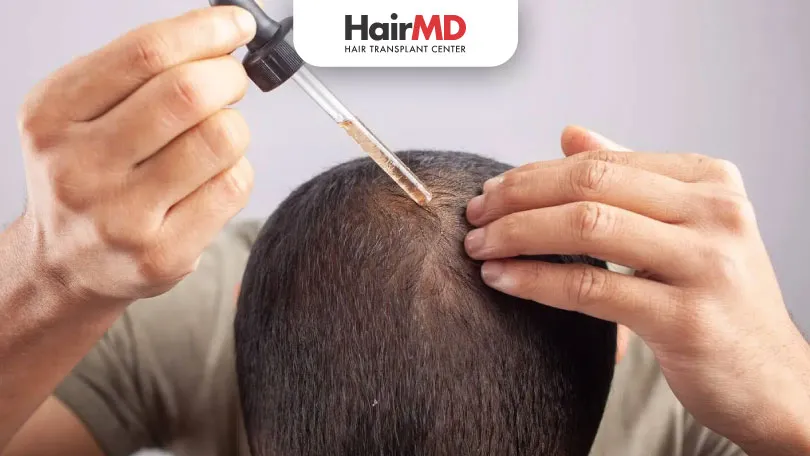25th July, 2024

Discover why taking Minoxidil and Finasteride after a hair transplant enhances results, promotes hair growth, and helps maintain your new hair. Learn expert insights now!
After undergoing a hair transplant, many patients wonder why they are prescribed medications like Minoxidil and Finasteride. While the transplant restores hair in balding areas, these medications play a crucial role in maintaining and enhancing the results. Minoxidil stimulates new hair growth, while Finasteride helps to block DHT, the hormone responsible for male pattern baldness. Together, they ensure that your newly transplanted hair thrives and reduces the risk of further hair loss.
What’s covered in the article?
- Why Do I Need To Take Minoxidil And Finasteride After Hair Transplant?
- Minoxidil and Finasteride
- Dosage of Finasteride Minoxidil
- Conclusion
Why Do I Need To Take Minoxidil And Finasteride After Hair Transplant?
Hair transplant is a hair restoration treatment to fix your baldness problem. We at HairMD, we get a lot of queries asking whether we need to take minoxidil and finasteride after a hair transplant or not. The truth is that you need to take them to get better hair growth in order to maintain the hair transplant further. I will give you detailed information about why taking medications after a hair transplant is important.
DHT is a hormone that causes hair follicles to miniaturize, and this contributes to male pattern hair loss. As DHT acts on hair which is situated on top of the scalp, it causes hair loss from the top of the scalp. Back of the scalp doesn’t have DHT receptors and is not affected by androgenetic baldness. When hair from the back of the scalp transplanted in the front of the scalp, as DHT is present in abundance at the top of the scalp. It is important if the patient has to take finasteride or minoxidil for the prevention from shedding off due to DHT right after Hair Transplant. Now, both of these drugs are not DHT blockers. The basic concept is to deviate the hair follicles from growing in one particular area of the head.
Minoxidil and Finasteride
Minoxidil nor finasteride will leave an adverse effect on your transplanted hair. Although, many experts suggest that you do not need finasteride or minoxidil to protect transplanted hair. But it is highly advisable to take it. You will have transplanted hair which will be transferred amongst your original hair. The same hair will continue to fall and thin over the period. This hair, which is prone to shedding, protected by finasteride which reduces hair loss in the future significantly. Make sure you should take these medications under the guidance of your dermatologist. As he is the best person to guide with how much dosage should be taken.
Dosage of Finasteride Minoxidil
Finasteride advised consuming when you can commit using it long-term. As it takes up to an entire year to see any effect. You can use minoxidil continually and regularly, provided you do not start and stop it. Minoxidil and finasteride are US FDA approved medications. In hair loss research these two are the only medications which can help you with hair regain.
Do You Know?
Nearly 250 Patients Visit HairMD
Everyday For Various Hair Concerns?
(Your journey to healthier and fuller hair starts here!)
Meet Our Dermatologists
Conclusion
In conclusion, taking Minoxidil and Finasteride after a hair transplant can significantly boost the longevity and success of your results. These medications work together to promote hair regrowth, prevent further hair loss, and strengthen existing hair follicles. While the treatment plan should be personalized by a medical professional, understanding the importance of these medications can help you make informed decisions for optimal post-transplant care.
Further Reading
Top Kitchen Ingredients to Boost Hair Growth
Discover the best kitchen ingredients for hair growth! Use coconut oil, onion juice, aloe vera & more to nourish your hair naturally and reduce hair fall.
How to Treat Alopecia Areata at Home: Natural Solutions for Hair Growth
Explore home remedies for alopecia areata to promote hair regrowth and boost confidence from home.
Redensyl vs. Minoxidil: Which is the Better For Hair Growth?
Discover the differences between Redensyl and Minoxidil for hair growth. Learn about their effectiveness, side effects, and which treatment might be better for you.
Biotin-Rich Foods for Natural Hair Growth
Know the best foods rich in biotin to help your hair to grow naturally stronger and healthier by experts from HairMD, Pune
Have thoughts? Please let us know
We are committed not only to treating you, but also educating you.











